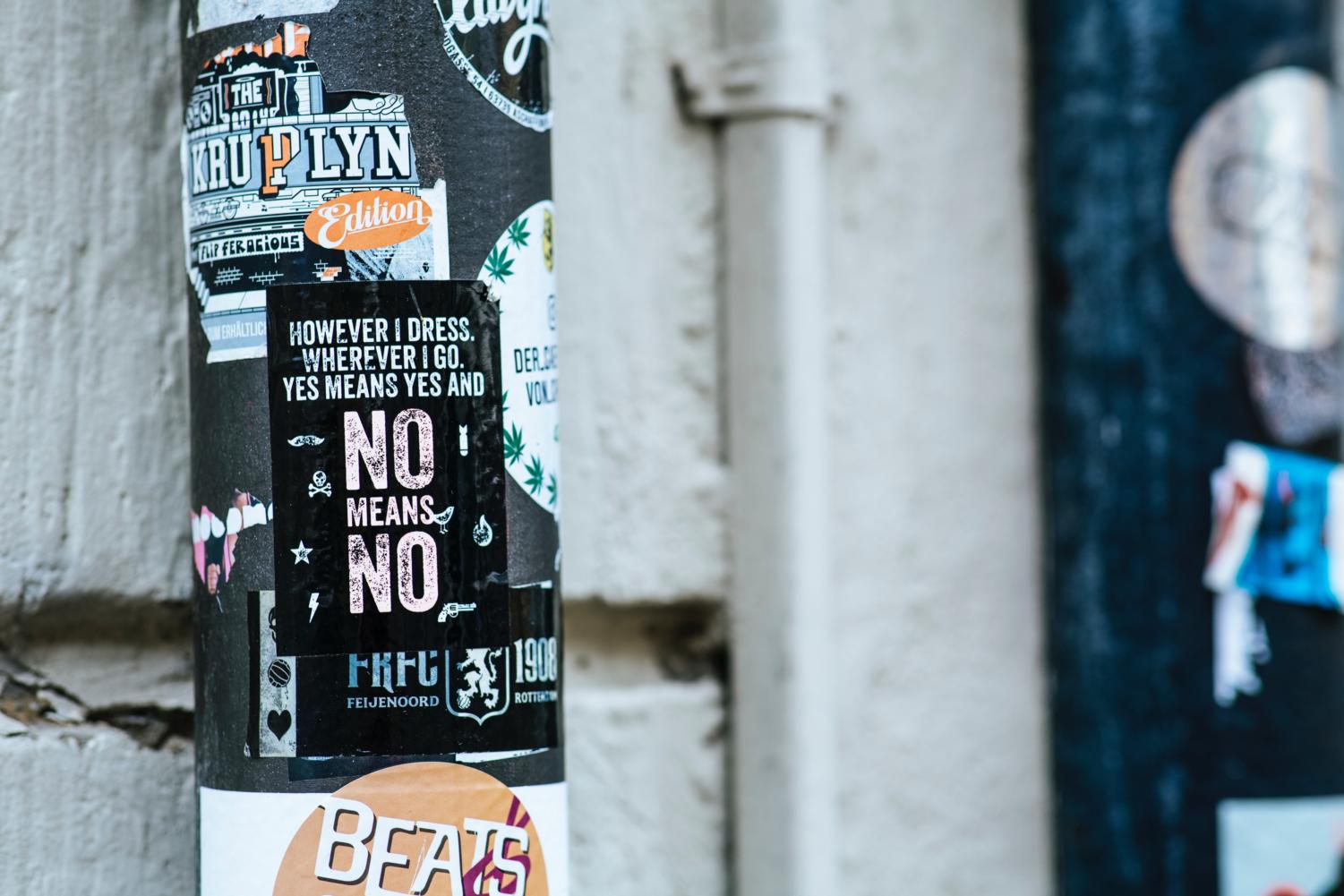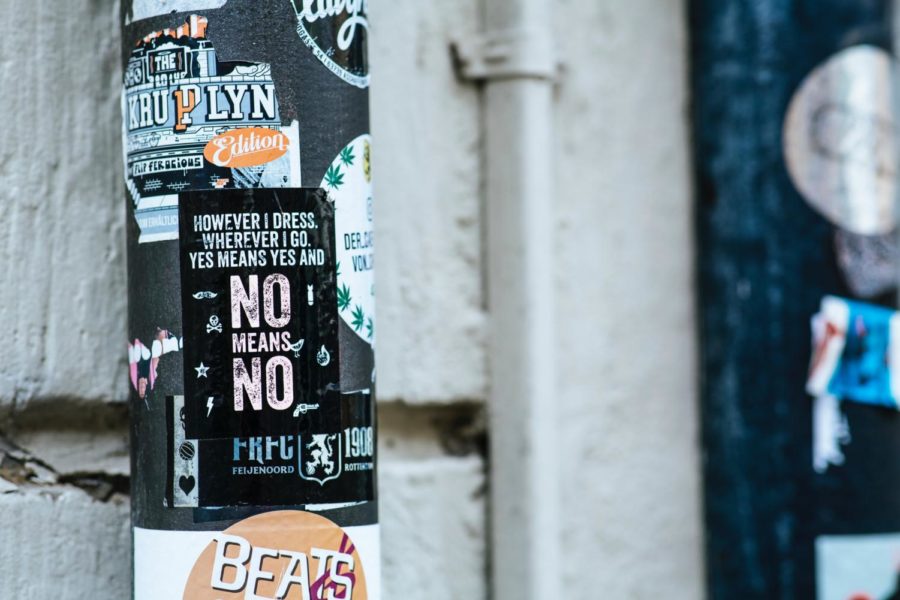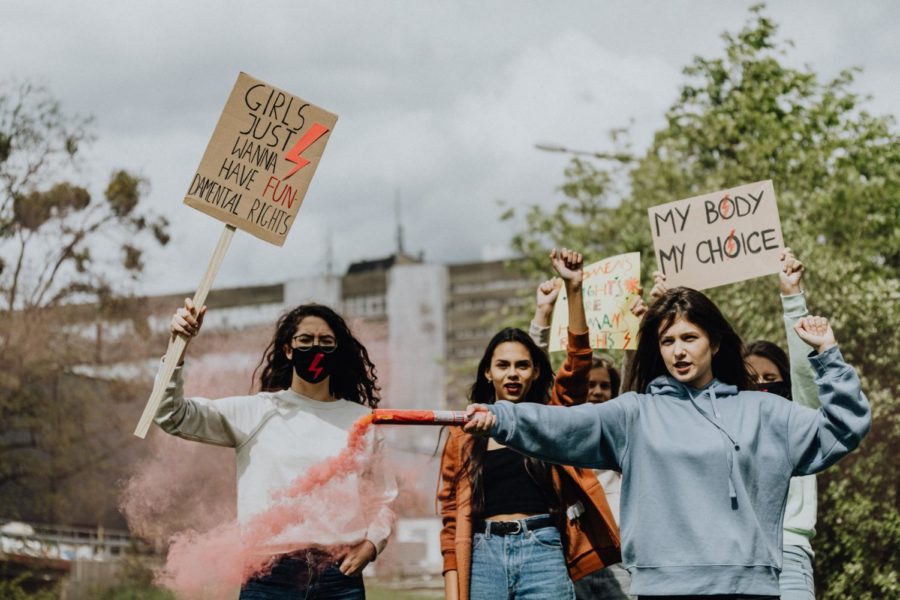Two Takes on Andrew Tate
November 1, 2022
Where is the truth in Andrew Tate?
Markus Spiske
Sticker showing the feminist rallying point “No means no,” protesting rape as a man’s responsibility to respect a woman’s consent, an opinion which Andrew Tate has advocated against.
Here’s a question. How many of you have actually watched an Andrew Tate debate in full? Of those people, how many have consumed content like his before? With those two questions, I can nearly guarantee I’ve weeded out the vast majority of people who criticize Andrew Tate.
I’m always surprised how indicative that is of people’s underlying scathing opinions: asking them how much they’ve engaged with the content. There is almost always a direct correlation with how sympathetic and understanding people are towards others and their opinions with how much they’ve actually listened to those people. The exact same is true of the deplatforming of Andrew Tate.
Let’s be clear here: I’m not here to defend Andrew Tate. He is, in my opinion, dumb, likely harmful and a prime example of toxic masculinity. But in the recent weeks since Andrew Tate’s deplatforming, I think we’ve been asking the wrong questions. Where many online celebrated his deplatforming, denounced his hypermasculine ideas, and ridiculed his viewers and content, it was almost impossible to find anyone asking a simple question: why did he get so popular in the first place? In other words, where is the truth in Andrew Tate?
It’s important to acknowledge that when I say truth, I mean the truth of who Andrew Tate speaks to. Andrew Tate makes prescriptive statements, statements about what society ought to be. And I’ll reiterate: I do not agree with his prescriptive statements or what he thinks society should be. But those prescriptive statements are only effective because they speak to descriptive realities. The thousands of men he speaks to, who feel isolated and alienated by women or by society, are the truth that I speak of. The descriptive truth that underlies Tate’s undeniable presence and influence.
And honestly, despite that preface, I get it why most people still would disagree. I understand why people are unwilling to understand a man who represents all that most detest. But I’m also old enough to remember a time when we on the left failed to understand the political far right and ignored their radicalization, and how that gave us four years of former President Trump.
I remember being in many of those 4chan boards and Nick Fuentes streams. The communities where the Holocaust was readily denied and people of Jewish descent racialized and denegrated, people considered Jewish or part of “The Establishment” were doxxed without question; how violent and willing people were to kill anyone other than the straight white male who stood in their way of a white nationalist state. How impossible it was to realize that I was falling down the rabbit hole.
What I remember most from those times is that ignorance and ridicule of the opposing side, be it the political right or anti-feminists, are not the cure for any radicalization of society, and I refuse to believe it’s the solution to Andrew Tate.
Over the last four years, deplatforming has become all the rage on the internet. What was once a niche practice has become commonplace, the removal of people from the face of the internet and all major social platforms happening nearly on the daily. Where before Bill Cosby maintained his Twitter account throughout his accusations and prosecution of sexual assault, now the literal President of the United States was deplatformed from almost every major platform in the blink of an eye.
What people rarely ask, though, is whether this deplatforming actually solves the problems we espouse it to solve, and whether it removes the root of the causes. As a matter of fact, it rarely does. A 2021 study found, in fact, that toxicity increased for far right users banned from Reddit when they moved to alternative platforms of increasing popularity like Gab, a social media platform whose company and CEO explicitly promote antisemetic and extremist christian ideas. Even just thinking about it logically, if someone of extreme beliefs interacted with either people of moderate or opposing view points or radicalized versions of their own positions, which would push someone to be more radical? If the only people you are surrounded by are people who are more extreme than you and entirely supportive of your values, it’s only natural that one would become more extremified, not less.
It feels ridiculous that we wouldn’t recognize this on the left, but killing a leader does not kill a movement. It took 12 premiers of the Soviet Union failing miserably for the nation to die on the vine, and yet the cause only grew stronger as time progressed. Millions died under American slavery before the cause was strong enough to warrant war, even more Americans to warrant victory for emancipation.
The idea that killing leaders or individuals is simply false, and it’s born of misconception. The reality is that leaders do not birth revolutions or movements, they feed on them. Killing a leader will not kill a movement, it will only anger it, give it a messiah and a martyr to champion.
We saw it with Trump over the last 3 years, his demagoguing and deplatforming not dissuading his audience and supporters. In fact, they only became more violent and more outspoken, more boisterous and more uncivil. So why do we think deplatforming Andrew Tate would work?
Maybe it was because Andrew Tate’s job was to speak to young, lonely, impressionable young men in a way that felt alien to Trump. His explicit goals and achievements in influencing young men felt tangible and real for many people in a way that Trump hadn’t; where Trump often reached isolated communities one at a time, Tate reached hundreds of thousands of young boys on the left and right through his viral content on Tiktok and his “Hustler’s University” program with over 168,000 members purported to make one versed in the trades of “Ecommerce, freelancing, cryptocurrency, investing, and business.”
But what Tate tapped into wasn’t unique either. Yes, his sudden rise in influence was unlike almost any other social creator in recent memory, but why do we so often dismiss and hand-wave that? Has anyone ever asked why that was the case?
Andrew Tate has been a controversial public figure for far longer than most people realize. When he was on the reality TV show “Big Brother” in 2016, he was revealed to have made homophobic comments on Twitter and then later to have brutally assaulted a woman in a video he would later call “a kinky sex video.”
He didn’t gain his cult following from these events though, and much of that can be chalked up to the difference in culture at the time. In 2016, the biggest cult leader of lonely men looking to find purpose in the repression of women was obvious: then president-elect Donald Trump.
Andrew Tate’s actions and views have remained the same for going on six years, the only difference is that now Donald Trump is no longer running for president. People like Richard Spencer, who in 2016 were able to command an entire audience to “Hail Trump!” now has almost entirely disappeared from public life due to his controversial and openly white supremacist speeches.
The growth of the alt-right and the far right did not happen overnight, and misogyny did not suddenly develop in the minds of young men in the last two years, it is simply the case that the events most recent to us are the ones we remember most as humans. Andrew Tate hasn’t changed in the last six years, and neither has his popularity. The only thing that has changed is the landscape.
The last two decades took elections and extrajudicial killing after killing before the far right and misogynistic ideas fully took root in mainstream society. People forget how long websites like 4chan and Kiwi Farms have been on the internet for, how many more dark web platforms there are that have existed for far longer. It took so long, though, specifically because it was largely unpopular. It didn’t take two decades to manifest itself at Charlottesville, Virginia because it was secretly lying dormant in every young white male in America, but because it took decades to amass such vitriol and hatred into large enough and tangible numbers to warrant a riot like Charlottesville.
So for Tate to rise the way that he did says so much about the movement he belonged to that so many overlook. By deplatforming him suddenly and justly, we assume that he alone is responsible for his meteoric growth. That his rise to fame can be attributed to him, that his fall from grace can mirror the disappearance of his audience.
But the reality is that such meteoric growth is an indicator of just how large this movement was. Most people aren’t old enough to remember MGTOW movements and Gamergate, how strongly they pulsed in the veins of most men for years. They miss the context of Andrew Tate simply by lacking the exposure to content like his, to the history that he belongs to, that he is not the first and is certainly not the last.
Deplatforming Andrew Tate will not kill this movement, it’s endured far worse. It’s endured murders, public scrutiny, and antagonism for years at this point. All it does is reflect on us as citizens that we don’t understand the cause of people like Andrew Tate, and that citizens of the internet today do not know what kills movements.
That’s the hardest part of the Andrew Tate problem: why do these men feel this way? Not only is this a movement far larger than most people could fathom, it’s a movement with more justification than most people think.
The reality is that more men are lonelier than ever. Fifty-one percent of young men 18-29 are single, as compared to only 31% of young women 18-29. Where young women’s (10-19) crude rate of suicide increased by only one death per 100,000 over the last 15 years, young men’s rate of suicide increased by two and a half deaths per 100,000 in that same timeframe, twice the change of women’s. As an absolute, young men commit suicide at a crude rate of 7.69 per 100,000, three times the rate of young women, who commit suicide at 2.53 per 100,000. In this reality of entirely valid and frustrated feelings of loss and disillusionment, surrounded by the isolating, hyper-capitalist American society, men look to consume a product that can solve all their problems with the snap of a finger.
Andrew Tate, at least for now, is that man. When people say Andrew Tate is a comedic caricature of all the exaggerated, ridiculous and toxic traits of men jumbled into one, they forget that those traits can tell us so much about how we need to approach these movements.
These movements are made up not of raging, violent murders and psychopaths, but of genuine, lonely men who don’t feel like they have a place in the world. It bears noting that intimate partner problems was a contributing factor in 62% of young men who commit suicide, deemed “the most significant single risk factor for suicide in men under 30” by a 2019 report by the National Violent Death Reporting System. These men, vulnerable to the volatility of relationships and insecure about their place among women, want to be confident like Tate, have sex like Tate, be funny like Tate, get money like Tate.
And are those traits such a bad thing? Can we blame young men for wanting such things in our society today? And do we blame any other person, woman or man, for wanting personal confidence, sexual confidence, humor or monetary success?
People have forgotten the truth that lies behind Tate. That deplatforming him will never kill his movement because it’s not his. That ridiculing people like him and demagoguing his caricature will not shame men into defeatism or cowardice or sudden improvement into “the men we want from society.”
These men are real people, with real reactions. They don’t suddenly just adapt or die. We’ve seen this with Trump supporters, in fact. When interviewing a prominent local Trump organizer named Dom Lucre, the New York Times found that when Lucre’s original group was banned from Facebook, “he’d already started a different group, with a nearly identical name, and it now has over 1,300 members. He also started an online chat room.”
When he was disowned and cut off from his family and disinvited from their gatherings, Lucre reported that “he has no plans to stop posting,” and was offered a position in the “Win the Win” campaign, an operative to reinstate Donald Trump as president. The woman told Lucre explicitly that “We’re ready for anything. We have tons of gas masks. Tons of bullets. Tons of magazines. Tons of A.R.s. Anybody who’s interested, hit me up. Hit me up on Facebook.”
Does that sound like a group hampered by deplatforming or fear? Does it sound like those people are less radicalized now that they have been ostracized, isolated, and left to only be consoled by people like them? Does it look like their truth has vanished into the thin air with their social media accounts?
Toxic masculinity is a virus, there is no doubt about that. But Tate is a symptom, not the source. And all deplatforming has done is put a lighter to the skin of our society. Until people understand that he is not the movement, but the martyr; that the movement is not the evil itself, and that the real truth behind Andrew Tate is thousands of understandably sad and lonely men, not a monolith of evil, we will never reform masculinity.
Deplatforming, like Andrew Tate, is a symptom of misunderstanding. A symptom of our inability to empathize with others. Until we realize how ineffective deplatforming truly is, we will never help the thousands of men Tate spoke to.

Sammy joined the Wildcat Tribune because nobody in real life wanted to listen to his opinions on music and the world anymore, and the Tribune seemed like its bar for staff writers had decreased enough for him...
The downfall of Andrew Tate
Trigger Warning: Contains mentions of sexual assault
If you are on social media you definitely must have come across a misogynistic public star named Andrew Tate. Over the course of the last few months, his audience grew along with a fan base of generally teenage boys. But his impact has promoted an outdated insufferable patriarchy amongst gen z.
If we know one thing about this generation is that social media plays an immense role in all of our lives. According to the American Academy of Child & Adolescent Psychiatry, teenagers nowadays spend anywhere between four to nine hours on their phones. Much of it is spent on TikTok, Instagram, Snapchat and more.
Although social media first began as an entertaining distraction from reality, many teenagers have found a safe haven in scrolling through social media for advice, company, and comfort.
But we all fail to see how much our opinions, actions, and thoughts are products of what social media and its influencers tell us to think or feel. One reason for this being group pressure and conformity– adjusting our behavior or thinking to a group standard. When conformity was researched by scientist Solomon Asch in 1955, he found that many students had severe discomfort in having differing responses from others. This was back before social media existed, so now that we have multiple platforms where opinions, thoughts, and movements go viral, people and especially impressionable children are more likely to plainly agree.
In addition, influencer content may also affect minors’ psychological well-being, materialism, body satisfaction, and thoughts. On the other hand, there are certain appeals influencers have because audiences look up to almost anyone with a following on social media. Most likely because the glamorized-looking life whether real or not is so attractive, especially to teenagers who have the same daily mundane tasks and routines. This gives any public star an upper hand, their body language, conversations, and the way they carry themselves are all being observed and possibly mimicked by a younger audience.
Andrew Tate has become one of the most recognizable names on social media over the last few months. The former kickboxer, entrepreneur, and content creator has amassed attention by speaking on a multitude of well-known podcasts to speak about his thoughts on women and the way he views life. He’s commonly seen as an aggressive man that radicalizes others to be powerful by treating others inhumanely, and I’d agree with that.
“Men who live without self control are the kind of men who cry when their girlfriend cheats on them, ‘cus she certainly does, because she doesn’t respect a little cry baby, and she’s only with you because she’s ugly as f*ck and she has to settle for a little soy boy p*ssy like you,” is just one prime example of the harmful masculinity Tate commonly expresses.
In a TikTok video posted on Aug. 14, a concerned 6th-grade teacher warns parents to monitor what their children consume, as a number of her 11-year-old boys have said they love Andrew Tate.
“I had a boy today, turn to a girl and tell her that she is fat, women need to be thin, and that she sits at home and eats all day like every other girl in the world, and [she] uses men to get money, and he works hard for his money,” said the 6th grade teacher.
A part of that may seem like regular middle school bullying, but keep in mind they are 11-years-old, and before that vocalized their newfound “love” for Tate. With Tate saying paralleling inflammatory language in podcasts and youtube videos, it’s easy to imagine where kids like this young boy can take their own views and language from.
In recent months a video of him physically attacking a woman emerged. Yet he faced no charges for it and continued to have a platform where he spread his injurious ideas. Multiple users on different platforms of social media did have in my opinion an ethical reaction, and many started to protest that he be removed from social media and convicted for what he’d done. Even other influencers began to speak out once they had seen that anything he says, does, or promotes tends to be harmful. It was no longer a joke, Tate was and is extremely real.
It’s outrageous that because of his privilege he faced no repercussions and to others, this situation was a picture-perfect example of a life without consequence. This lets his viewers believe they can live a life based on outlandish views and that abusing women is acceptable in society. Let me tell you something, it’s not, it’s far from acceptable or understandable.
An anonymous teacher from an all-boys school in New Zealand wrote to the Instagram account @sh*tyoushouldcareabout describing Tate’s influence as a “poisonous addiction” for the students that attend the school.
Part of conversations heard amongst their 13-15-year-olds include: “Women who are sexually assaulted are ‘asking for it’ and “if a woman has had abortions already she loses the right to use the statement ‘her body her choice.’
The content itself of Tate is just damaging though, it is the fact that his tactics of spreading such vile hatred are intentional and abusive. In a recent article by The Guardian, “The coordinated effort, involving thousands of members of Tate’s private online academy Hustler’s University and a network of copycat accounts on TikTok, has been described by experts as a blatant attempt to manipulate the algorithm and artificially boost his content, by also ‘choosing the most controversial clips in order to achieve maximum views and engagement.’”
There are a few claims that most of the time Tate is just joking, and that sometimes he makes that clear after he says something questionable, but because only the controversial parts of him are circulating on social media we are too quick to judge.
While that may be true, that only the negative is being shown on social media it doesn’t change the fact that he said it or change the underlying hurtful and harmful depraved messages that social media is allowing to proliferate. Simply because there are some tolerable things he may convey it doesn’t undo or take away from the bad. It doesn’t change the number of people that view it and not to mention his hashtag on TikTok alone has 17.2 billion views, so clearly many are watching him, fan or not.
Yes, everyone has a right to their own opinion, and according to the First Amendment freedom of speech. But should we really be allowing someone that plagues the minds of future generations to have a platform?
Now I’m not here to argue that cancel culture should be normalized like it currently is. Especially in today’s world, cancel culture is common and can be seen every other day ranging from micro influences like Tiktok’s “Bodega Bro” to A-list celebrities like Kevin Hart. These people, innocent or not, are under a microscope of intense scrutiny. Any small mistake or even harmless gesture may be brought up at any time without proper justification to destroy their lives.
But Andrew Tate isn’t just an innocent anonymous internet user who’s never been in the limelight before, nor were the mistakes he’s made small or harmless. Andrew Tate is someone that specifically encourages a hateful and malignant society, and is entirely undeserving of the platform he held. He doesn’t deserve to be reposted, be seen in edits, podcasts, or youtube videos.
Children’s minds are still growing and maturing. They are in a stage where what they experience, and what they see leave an imprint. So in a time where social media is a part of everyday life, Andrew Tate losing his platform is the best thing that could have happened.

Shreya has been in the Wildcat Tribune since her freshman year and was a Copy Editor last year. She enjoys it because it's a class that allows her to express her thoughts and opinions, but also keeps her up...


